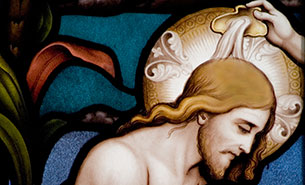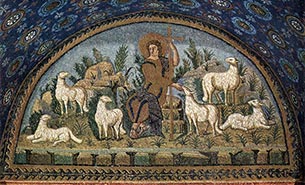
Christian Philosophy & Culture

The Word (Logos) of God & The Holy Bile
The Holy Bible contains the Word of God. God speaks and man listens. This is the truth. This phrase, however, does not give the whole truth about the Revelation of God in the Holy Bible, because the Holy Bible describes God's salvific works for man and mankind, interprets them and offers their true meaning to men. The Holy Bible is "God's word" for our benefit. God acts and speaks in the Holy Bible and we do not just listen but participate in what God does for us. God's salvific works and their interpretation are held for our benefit within the Liturgy. This is the will of God. Christian worship is incomprehensible outside the framework of God's Last Will and Testament with us. God's Last Will and Testament is a historical fact which is repeated in the Liturgy with the "anamnisis" (remembrance) and… Read more >

The Name Tradition In The Christian Culture
Names have always been of major importance for human communication and understanding given the fact that they have always played the role of those elements through which people, animals and objects were defined. The name was soon developed into a means of determining a person or a thing. If this is important for the plant and animal world, it is much more important for man where the personal character is much more intense and the special characteristics of each person appear in a different and unique way. The name and naming were developed in connection with the peoples' history and adventures. Through names we can follow the historical progress of an entire nation. Quite often some names hold a fascination… Read more >

The Christian Church: The Symbolism (Part 1 of 4)
What exactly is the meaning of symbolism? The indirect expression by means of an image of something which no form, visual or verbal, can convey directly, for all means are inadequate and powerless in face of the truth which they must try to express. Symbolism, the language of mystery, reveals the truth to those who know how to interpret it, while concealing it from the uninitiated. Colloquial speech confuses the meanings of "sign" and "symbol". Spiritually, it is advisable to distinguish them. The sign limits itself to indicating a particular fact; the symbol expresses and somehow incorporates and makes present a higher reality. To understand a symbol is to experience… Read more >

The Christian Church: The Church Building (Part 2 of 4)
Christian life is based on two essential truths: the one is the redemptive sacrifice of Christ, and the need to participate in this sacrifice, to be identified with it in order to be saved, the need for everyone to recapitulate, to repeat, so to speak, the sacrifice in his own soul. The other essential truth-the purpose, the result, and the very meaning of this sacrifice is the transfiguration of man and with him of the whole visible world, which was dragged down by man in his fall. This is what peace between God and the world means. It is this second truth which constitutes the principal subject of the symbolism of the church. In fact, the whole of God's revelation to man, and the immensity of the sacrifice made by God for… Read more >

The Christian Church: The Inner Decoration (Part 3 of 4)
We shall speak here only of the classic type of decoration in its principal features, in order to complete the general picture of a church. From the eleventh century-that is to say, from the post-iconoclastic period, when the system of church decoration was definitively determined-until the end of the seventeenth century, the arrangement of iconographical themes remained unchanged, at any rate in the monuments which have survived. Naturally, this stability and uniformity can be seen only in the general features and not in the details of the decoration.… Read more >

The Christian Church: Church & Community (Part 4 of 4)
The very meaning of the church, its raison d' ê tre , demands that it should be different from all other buildings, with a character of its own. This specific character corresponds to and expresses the specific nature of the Church. According to the words of Jesus Christ Himself, His Church is a Kingdom "which is not of this world". Yet the Church lives in the world and for the world, for its salvation. This is the purpose of her existence. Since she is a 'Kingdom which is not of this world' she has her own nature, which is distinct from that of the world. She cannot accomplish her purpose unless she remains faithful to her own specific nature, faithful to herself. Her way of life, her means of action, her methods are other… Read more >


